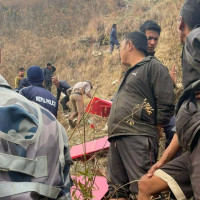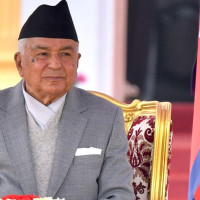- Tuesday, 3 March 2026
Democratic Culture Beats Zero-sum Politics
Democratic politics is norm-based and underscores the dignity of human life. Its legitimacy springs from constitutional procedures, elections, public opinion and international recognition. It offers political ideas and reasoned conversation accessible to every Nepali under the right to information. It is a right which is expected to enlighten people in making correct choices on vital decisions and turn the governance transparent. But a lack of sufficient communicative, economic and educational preconditions has left the growth of civic culture largely sluggish, not vibrant and endlessly stirring, not evocative of a stream of confessions and reflections about the human condition.
Politics by every means signifies a game of opportunism, expediency and normative dearth. Its drive, passion, assertion of rights and self-interest partly embody the Dionysian nature of zero-sum game and partly the Apollonian direction of rationality, moderation, constitutional constraints and cooperation deemed a win-win. Only socialisation of Nepali politicians in public and national spirit can enable them to outdo hedonistic calculus and opt for a win-win outcome. Artistic thought about democratic ideals and public action to execute them can exonerate Nepali leaders from reactive psychology to high sensitivity about each other and rely on performance legitimacy.
Critical scrutiny
Owing to stunted accountability, Nepali politics is now under critical scrutiny on all fronts. Ordinary people and a myriad of opposition forces hence find its drive and direction nauseating, not liberating. Ideally, democratic politics is an arena of realistic promise. It evokes public expectation for a good life and urges leaders to engage in political mobilisation and electoral competition for votes and form a lawful government to manage supply side as constitutional duties. Nepal’s electoral politics is, however, marked more by personality contests than by ideologies and policy issues. It hovers around the conch shell of the leader's network and thus ignites a fire of razes, not a gleaming blaze of hope.
As a result, its outcome hardly makes a difference to ordinary Nepalis. The inner life of politicians, their ability to reflect conscience and openness to learn the art of politics are three qualities to make them responsive to democratic rule. One general criticism of Nepali politics is that it has changed the structural features in the process of dislodging the regime but failed to standardise the living conditions of people and the institutional muscle of the Nepali state. Only deep democracy can erase the malaise of politics by every means and deter structural violence in public life.
The Nepali establishment and many layers of its opposition are indulging in mutual indictment, not mutual accountability, to systematically dispense the functions of the state, polity, government and civic institutions to promote public security and wellbeing. Political debates are becoming increasingly acidic over the collusion of illicit forces such as free riders, special interest groups, contractors and consultants who allied with political classes crush the very purpose of politics to shore up public goods. It is hard to alter the political culture of pathological deceit when the coalition government of a diverse range inherently becomes wobbly and allows manipulating forces to gain firm grounds in the political sphere. Weak enforcement of the law and the Nepali state's flaw in the monopoly of power to execute the constitution are the fundamental causes.
When every powerful group has its own media, intellectual circle and geopolitical justification, the nation’s fate lingers in the abyss of shakiness, looking for an anchor of transformational leaders or statespersons capable of forging a common ground of all political forces on national policies and priorities and steering the nation ahead in a turbulent geopolitical shift. The critical task in Nepal is to bring morality to political life and justice to economic spheres. They are vital pulls for the people to reap social and economic opportunity, make sensible choices, escape from the ruggedness of life and set a level playing field. Nepal's constitution aims to create an egalitarian society where each person can live in peace, security and dignity.
The right to work embedded in the constitution aims to animate it but laws do not have correspondence with the policy spirit to end economic insecurity and acquire affordable health care, education and housing and build a resilient community. Only the production revolution can shift politics from politicians to people and ensure the realisation of their right to work where Nepalis do not have to toil in oppressive and unsafe circumstances and where the provisions of human rights are implemented. Bernie Sanders rightly argues, “Real politics identifies the real causes of our problems. It does not shy away from the challenges posed by uber-capitalism." He adds, “Economic elites will never support policies that threaten their wealth and power.”
Tax evasion, rent-seeking and legal loopholes for the powerful to escape laws only wreck the moral vim of Nepali society and gnaw its material edifice without shame. It is crucial to bring politics to a lawful track, away from the train of every political means to stay in power. Party reforms are urgent to affirm popular sovereignty, not turn cadres and members into a servile cog of the party machine easily dispensable by bosses and deprived of opportunity, dignity and voice for being critical. The subordination of cadres strips them of the virtue of citizenship, loyal to the Nepali state and capable of making leaders accountable to their promises. This shrinks their civic competence. Each political party is enthralled by the constitutional amendment to soothe the restless Nepalis but it does not know where and how to begin it and how far and how fast.
The imperative of fractious leadership is survival, not proactive taking national initiative for progress. The fall of the regime has high costs for them. Monopolisation of institutional means and even evading the due succession of leadership only put politics in the shadows. For ordinary Nepalis, politics is the domain of rights realisation, while for the political class, it is an arena of privilege and impunity. This is why even non-political forces such as civil society, business and bureaucracy align with political classes to shape political outcomes either through participation or through whipping politics up by every means, even selling incentives. The emerging social movements are, therefore, challenging it to make political leadership and their parties attuned to constitutional behaviour.
New technological change is stratifying the social division of labour and efficiency. Digital life has begun to separate the public life from the private, rendering it more insular, individualised and ethically-neutral. The primacy of the private has left the public sphere for mutual learning and perspective forming very feeble and febrile. Its effects are disproportionate to the rural areas, the poor and the marginalised. As a result, their voices are less listened to in public policy. The West’s confinement of religion to the private sphere is challenged in Nepal as its connection to dharma (ethical code) is deep and demoralisation of politics has become a major trigger point of debate about secularism.
Bernie Sanders forcefully argues, “The pace and direction of technological change cannot be left to the market forces if there is to be hope for a fairer distribution of benefits of that change.” To be sure, breaking the monopoly of economic power that enjoys astronomical payoffs is as important as breaking the syndicated regime evolved in the nation to make democracy beneficial to the people, so that they are not anguished by the pain of political stasis. Only a coalition of Nepali civil society infused with a sense of national duty can bring the people to their cause and transform the party of political classes to the party of people in solidarity with their daily life and hope.
The constitutional culture of Nepal, like its political culture, seems tenuous to gear the national political course forward to improve governance, unleash the creative power of society and set the state-society coherence by harmonising the capacity of the Nepali state to create order and societal propensity to enjoy freedom, justice and self-governance. The state-people unity is important in Nepal to add governance efficacy, stabilise intergenerational social contract and carry out global obligations. The resolution of disharmony between popular expectation and desolate conditions improves the integrity of the Nepali polity and enforces accountability to the public.
Democratic politics flourishes when public opinion shapes public policies and national rationality overrides alien conditionality and misplaced priorities. They are less compatible with democratic stability, political institutionalisation and participatory progress. One general weakness of the Nepali political economy is that the share of wealth of the new economy and technology has not gone to the ordinary Nepalis. The proceeds of finance, automation and AI remain with the enlightened, skilled and technology-efficient urban elites who are unbeaten in balancing life and work, not the workers and peasants crushed by workload and even unable to eke out a living within the nation.
Time of transition
Nepali leaders have yet to learn that the time of transition is the time of catching up with the changing nature of politics, market, technological innovation and geopolitics. This is the time of balancing economic well-being with freedom of choice in politics, a choice that creates hope of an equal opportunity for all people. Nepali welfare state seeks to make basic needs non-negotiable. The irony in the nation is that the younger generation of politicians is maladjusted to a patronage-based political culture. As a result, Nepali democracy is losing its lustre and becoming rasping.
Once a rational, non-partisan political system is placed in Nepal, positive signs of progress can begin to grow; trust of people increases in leadership and institutions and misallocation of resources is proscribed. It is also capable of resolving the dialectics between constitutional vision, problems of scarcity and the deficits of basic needs. Social goods can be equated with common goods such as a clean environment and water, public health, public education and a vibrant public sphere that gives importance to dialogue, sense of belonging and connectedness of Nepalis to their land, values and institutions, which cannot flatten politics to every means.
(Former Reader at the Department of Political Science, TU, Dahal writes on political and social issues.)
















